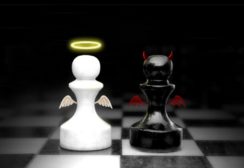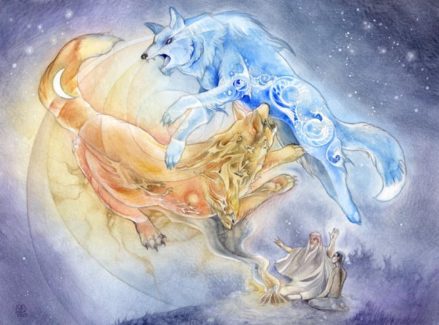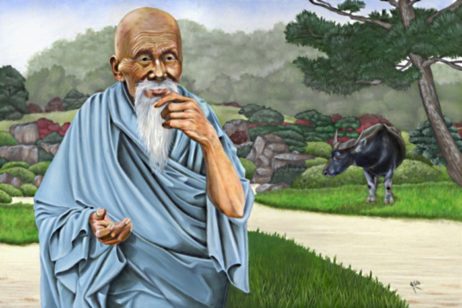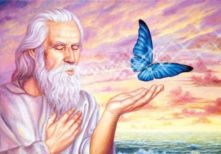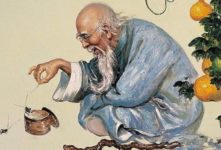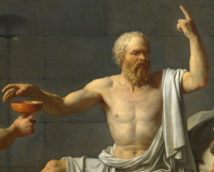A parable is one of the most ancient varieties of a cautionary tale. Instructive allegories make it possible to briefly and concisely give any moral attitude without resorting to direct conviction. That is why the parables about life with morality - short and allegorical - at all times have been a very popular educational tool, touching on a variety of problems of human existence.
Material Content:
Parables of Good and Evil
The ability to distinguish between good and evil distinguishes a person from an animal. It is not surprising that the folklore of all peoples keeps many parables on this subject. They tried to give their own definitions of good and evil, to study their interaction and explain the nature of human dualism in the Ancient East, and in Africa, and in Europe, and in both Americas. The large corpus of parables on this subject shows that for all the difference of cultures and traditions, the idea of these fundamental concepts among different peoples is common.
Two wolves
Once upon a time, an old Indian revealed to his grandson one vital truth:
- In each person there is a struggle, very similar to the struggle of two wolves. One wolf represents evil - envy, jealousy, regret, selfishness, ambition, lies ... Another wolf represents good - peace, love, hope, truth, kindness, loyalty ...
The little Indian, touched to the core by the words of his grandfather, thought for a few moments, and then asked:
“And which wolf wins in the end?”
The old Indian smiled faintly and answered:
“The wolf you feed always wins.”
Know and do not
The young man came to the sage with a request to accept him as a student.
- Can you lie? Asked the sage.
- Of course not!
- And to steal?
- No.
- A kill?
- No…
“So go and know all this,” exclaimed the sage, “but when you know, do not!”
Black dot
Once a sage gathered his disciples and showed them a regular sheet of paper, where he drew a small black dot. He asked them:
- What do you see?
All answered in unison that the black dot. The answer was not correct. The sage said:
“But don’t you see this white sheet of paper - it is so huge, bigger than this black dot!” And so it is in life - the first thing we see in people is something bad, although there is much more good. And only a few immediately see the "white sheet of paper."
Parables of happiness
Wherever a person is born, no matter who he is, no matter what he does, in fact, he does one thing - he seeks happiness. This inner search continues from birth to deathbed, even if not always realized. And a lot of questions lie in wait for this person. What is happiness? Can one be happy without anything? Is it possible to get happiness ready, or do you need to create it yourself?
The idea of happiness is as individual as DNA or fingerprints. For some people and the whole world, it’s not enough to feel at least satisfied. Another small enough - a sunbeam, a friendly smile. It seems that there can be no agreement between people on this ethical category. And yet, in various parables about happiness, points of contact are revealed.
Piece of clay
God made man out of clay. Blinded for man earth, home, animals and birds. And he left an unused piece of clay.
- What else to blind you? - asked God.
“Blind me of happiness,” the man asked.
God didn’t answer, he thought about it and put the remaining piece of clay in the palm of his hand.
Money can not buy happiness
The student asked the Master:
- How true are the words that happiness is not in money?
The master replied that they were completely faithful.
“It's easy to prove.” For money you can buy a bed - but not a dream; food - but not appetite; medicines - but not health; servants - but not friends; women - but not love; home - but not a home; entertainment - but not joy; teachers - but not the mind. And what is called does not end there.
Khoja Nasruddin and the traveler
Once Nasruddin met a sullen man wandering along the road to the city.
- What's the matter? Hodja Nasruddin asked the traveler.
The man showed him a battered travel bag and said plaintively:
- Oh, I'm miserable! Everything that I own in an infinitely vast world will hardly fill this miserable, worthless bag!
“Your deeds are bad,” Nasruddin sympathized, grabbed the bag from the traveler’s hands and ran away.
And the traveler continued on his way, shedding tears. Meanwhile, Nasruddin ran forward and laid a bag right in the middle of the road. The traveler saw his sack lying on the way, laughed with joy and cried out:
- Oh, what a blessing! And I already thought that I had lost everything!
“It is easy to make a person happy by teaching him to appreciate what he has,” Khoja Nasreddin thought, watching the traveler from the bushes.
Wise parables of morality
The words “morality” and “morality” in Russian have different shades. Morality is rather a public attitude. Morality is internal, personal. However, the basic principles of morality and morality are largely the same.
Wise parables easily, but not superficially, affect precisely these basic principles: man’s attitude to man, dignity and baseness, attitude to the homeland. Issues of the relationship between man and society are often embodied in parable form.
Bucket of apples
A man bought himself a new house - large, beautiful - and a garden with fruit trees near the house. And nearby, in an old house, there was an envious neighbor who was constantly trying to spoil his mood: either he would throw garbage under the gates, or some other muck.
Once a man woke up in a good mood, went out onto the porch, and there - a bucket of wastes. A man took a bucket, poured slops, cleaned the bucket to a shine, collected the largest, ripe and most delicious apples into it and went to a neighbor. A neighbor opens the door hoping for a scandal, and a man handed him a bucket of apples and said:
- Who is rich in what, that is what he shares!
Low and decent
One padishah sent the sage three identical bronze figurines and ordered to convey:
“Let him decide which of the three people whose sculptures we are sending is worthy, who is so-so and who is low.”
No one could find any difference between the three figurines. But the sage noticed holes in the ears. He took a thin flexible wand and stuck it in the ear of the first figurine. The wand came out through the mouth. At the second figurine, the wand came out through the other ear. At the third figurine, the wand is stuck somewhere inside.
“A man who divulges everything he hears is certainly low,” the sage reasoned. - The one who has a secret enters one ear and leaves through another - a man is so-so. Truly noble is the one who keeps all secrets in himself.
So the sage decided and made the corresponding inscriptions on all the statuettes.
Change your voice
Dove saw an owl in the grove and asked:
- Where are you from, owl?
“I lived in the east, and now I'm flying to the west.”
So the owl answered and began to grin and laugh viciously. Dove asked again:
“Why did you leave your home and fly to foreign lands?”
“Because in the east they don’t love me because I have a nasty voice.”
“You left your homeland in vain,” said the dove. - You need to change not the earth, but the voice. In the west, just as in the east, they do not tolerate evil hoots.
About Parents
Attitude to parents is a moral problem long ago solved by mankind. Biblical legends about Hama, gospel commandments, numerous proverbs, fairy tales fully reflect people's ideas about the relationship between fathers and children. And yet, there are so many contradictions between parents and children that it is not out of place for a modern person to remind about this from time to time.
The constant relevance of the topic "Parents and Children" gives rise to more and more parables. Modern authors, following in the footsteps of their predecessors, find new words and metaphors to relate to this issue again.
Feeder
Once upon a time there was an old man. His eyes were blinded, his ears were dull, and his knees were trembling. He almost could not hold a spoon in his hands, spilled soup, and sometimes food fell out of his mouth.
The son and his wife looked at him with disgust and began to put the old man in a corner behind the stove during a meal, and they served him food in an old saucer. Once the old man's hands shook so much that he could not hold a platter of food. It fell to the floor and crashed. Then the young daughter-in-law began to scold the old man, and the son made his father a wooden feeding trough. Now the old man was supposed to eat from her.
Once, when the parents were sitting at the table, their little son came into the room with a piece of wood in their hands.
- What do you want to do? - asked the father.
“A wooden feeding trough,” the baby answered. - When I grow up, dad and mom will eat from it.
Eagle and eagle
An old eagle flew over the abyss. On the back he carried his son. The eaglet was still too small and could not overpower this path. Flying over the abyss, the chick said:
- Father! Now you carry me through the abyss on my back, and when I become big and strong, I will carry you.
“No, son,” the old eagle answered sadly. “When you grow up, you carry your son.”
Suspension bridge
On the way between two highland villages was a deep gorge. Residents of these villages built a suspension bridge over it. People walked on its wooden planks, and two cables served as a railing. People are so accustomed to walking on this bridge that they could not hold on to the railing, and even children fearlessly ran across the gorge on the planks.
But once the railing cables disappeared somewhere. Early in the morning, people approached the bridge, but no one was able to take a step on it. While there were cables, it was possible not to hold on to them, but without them the bridge turned out to be impregnable.
This happens with our parents. While they are alive, it seems to us that we can do without them, but as soon as we lose them, life immediately begins to seem very difficult.
Everyday parables
Everyday parables are a special category of texts. In human life, every moment a situation of choice arises. What role in fate can play minor, seemingly trifles, inconspicuous little meannesses, stupid provocations, absurd doubts? Proverbs answer this question unequivocally: a huge one.
For the parable, there is nothing inconsequential and unimportant. She firmly remembers that "the flutter of a butterfly's wing responds with thunder in distant worlds." But the parable does not leave a person alone with the inexorable law of retribution. She always leaves the opportunity for the fallen to rise and continue the path.
All in your hands
A sage lived in a Chinese village. People from all over came to him with their problems and illnesses, and no one left without receiving help. For this they loved and respected him.
Only one person said: “People! Who are you worshiping? It’s a charlatan and a con man! ”Once he gathered a crowd around him and said:
“Today I will prove to you that I was right.” Come to your sage, I will catch a butterfly, and when he steps out onto the porch of his house, I will ask: “Guess what is in my hand?”. He will say: “Butterfly,” - anyway, one of you will let slip. And then I ask: “Is it alive or dead?” If he says that he’s alive, I will squeeze his hand, and if he’s dead, then I will release the butterfly to freedom. In any case, your sage will be stupid!
When they came to the house of the sage, and he went out to meet them, the envious asked his first question:
“Butterfly,” the sage answered.
“A dead or alive?”
The old man, smiling at his beard, said:
“Everything is in your hands, man.”
Bat
A long time ago, a war broke out between the beast and the birds. The hardest thing was the old Bat. After all, she was both an animal and a bird at the same time. And therefore, she could not decide for herself who it was still more profitable for her to join. But then she decided to cheat. If the birds prevail over the animals, then it will support the birds. Otherwise, it quickly rushes to the beasts. So she did.
But when everyone noticed how she was behaving, then they immediately suggested that she not run from one to the other, but once and for all to choose one side. Then the old Bat said:
- No! I will stay in the middle.
- Good! - said both sides.
The battle began and the old Bat, being in the middle of the battle, was crushed and died.
That is why someone who is trying to sit between two chairs will always be on the most rotten part of the rope that hangs over the jaws of death.
The fall
One student asked his Sufi mentor:
“Teacher, what would you say if you knew about my fall?”
- Get up!
- And next time?
- Get up again!
“And how long can this go on — does everything fall and rise?”
“Fall and rise as long as you are alive!” After all, those who fell and did not rise are dead.
Orthodox parables about life
Another academician D.S. Likhachev noted that in Russia the parable as a genre “grew” from the Bible. The Bible itself is littered with parables. It is this form of teaching the people that Solomon and Christ chose. Therefore, it is not surprising that with the advent of Christianity in Russia, the parable genre was deeply rooted in our land.
Popular faith has always been far from formalism and "book" complexity. Therefore, the best Orthodox preachers constantly turned to allegory, where they generalized transformed the key ideas of Christianity into a fabulous form. Sometimes Orthodox parables about life could be concentrated in one phrase-aphorism. In other cases, in a short story.
Humility is a feat
Once, a woman came to Optina’s hieroskhimonakh Anatoly (Zertsalov) and asked him for blessings for a spiritual achievement: to live alone and fast without interruption, fast, pray and sleep on bare boards. The elder told her:
- You know, the evil one does not eat, does not drink and does not sleep, but everything lives in the abyss, because he has no humility. Obey in all the will of God - this is the feat for you; humble yourself before everyone, rebuke yourself in everything, bring illness and sorrow with thanksgiving - this is beyond all deeds!
Your cross
It seemed to one person that he was living very hard. And he once went to God, spoke of his misfortunes, and asked Him:
- May I choose a different cross for myself?
God looked at the man with a smile, led him to the vault, where the crosses were, and said:
- Choose.
A man walked for a long time in the storehouse, looking for the smallest and lightest cross, and finally found a small-small, light-light cross, went to God and said:
“Lord, can I take this one?”
“You can,” God answered. “This is your own.”
About love with morality
Love moves the worlds and human souls. It would be strange if the parables ignored the problems of relations between men and women. And here the authors of the parables raise a great many questions. What is love? Can you give her a definition? Where does it come from and what destroys it? How to find it?
Narrower aspects are also affected. Household relations between husband and wife - it would seem that it could be more commonplace? But here, too, the parable finds food for thought. After all, it is only in fairy tales that the marriage ends. And the parable knows: this is just the beginning. And keeping love is no less important than finding it.
All or nothing
One man came to the sage and asked: “What is love?” The sage said: “Nothing.”
The man was very surprised and began to tell him that he had read many books that described that love is different, sad and happy, eternal and fleeting.
Then the sage replied: “That's it.”
The man again did not understand anything and asked: “How do you understand? All or nothing?"
The sage smiled and said: “You yourself have just answered your question: nothing or all. There can be no middle! ”
Mind and heart
One person claimed that the mind on the street of love is blind, and that the main thing in love is the heart. As proof of this, he cited a story about a lover who sailed over the Tiger River many times, bravely fighting the course to see his beloved.
But once he suddenly noticed a speck on her face. After that, crossing the Tiger, he thought: "My beloved is imperfect." And at that moment the love that kept him in the waves weakened, in the middle of the river the forces left him, and he drowned.
Repair, not throw away
An older couple who lived together for more than 50 years was asked:
- Probably, you have never quarreled in half a century?
“Swearing,” the husband and wife answered.
- Maybe you never had a need, you had perfect relatives and a house - a full bowl?
- No, it's like everyone else.
“But you never wanted to break up?”
- There were such thoughts.
“How did you manage to live together for so long?”
- Apparently, we were born and raised at a time when broken things were usually repaired, not thrown away.
Don't demand
The teacher found out that one of his students persistently sought someone's love.
“Don’t demand love, you won’t get it,” said the teacher.
- But why?
“Tell me, what do you do when uninvited guests burst at your door, when they knock, scream, demanding to be opened, and tear off their hair from what they do not open?”
“I lock her harder.”
- Do not break in the doors of other people's hearts, because they will close even stronger before you. Become a welcome guest and any heart will open before you. Take an example from a flower that does not chase bees, but giving them nectar attracts them to itself.
Short parables about insult
The outside world is a harsh environment that constantly pushes people against each other, carving sparks. The situation of conflict, humiliation, insult received can permanently knock a person out of a rut. The parable here comes to the rescue, playing a psychotherapeutic role.
How to respond to the insult? Unleash anger and respond insolently? What to choose - the Old Testament "an eye for an eye" or the gospel "turn the second cheek"? It is curious that of the entire corpus of parables about insults, Buddhist ones are most popular today. A pre-Christian, but not Old Testament approach seems to our contemporary to be the most acceptable.
Go your own way
One of the students asked the Buddha:
“If someone offends or hits me, what should I do?”
“If a dry branch falls on you from a tree and hits you, what will you do?” - he asked in response:
- What will i do? It’s a simple coincidence, a simple coincidence that I ended up under a tree when a branch fell from it, ”said the student.
Then the Buddha remarked:
“So do the same.” Someone was insane, angry and hit you. It’s like a tree branch fell on your head. Let this not bother you, go your own way, as if nothing had happened.
Take it to yourself
Once, several people began to viciously insult the Buddha. He listened silently, very calmly. And so they felt uneasy. One of these people turned to the Buddha:
“Can't our words hurt you ?!”
“It's up to you to insult me or not,” the Buddha replied. - And mine - to accept your insults or not. I refuse to accept them. You can pick them up for yourself.
Socrates and the insolent
When some insolent man struck Socrates with his foot, he endured it without saying a word. And when someone expressed surprise at why Socrates ignored such a blatant insult, the philosopher remarked:
“If a donkey kicked me, would I really be bringing him to trial?”
About the meaning of life
Reflections on the meaning and purpose of being belong to the category of so-called “damned questions”, and no one has a clear answer. However, a deep existential fear - “Why do I live if I die anyway?” - torments every person. And of course, the proverbial genre also addresses this issue.
Every nation has parables about the meaning of life. Most often it is defined as follows: the meaning of life is in life itself, in its endless reproduction and development through subsequent generations. The short life of each individual person is considered philosophically. Perhaps the most allegorical and transparent parable of this category was invented by the American Indians.
Stone and bamboo
They say that once a stone and bamboo argued strongly. Each of them wanted a person’s life to be like his own.
The stone said:
- A person’s life should be the same as mine. Then he will live forever.
Bamboo replied:
- No, no, a person’s life should be like mine. I die, but immediately born again.
Stone objected:
- No, let it be better in a different way. Better be a man like me. I do not bow under the breath of wind, nor under the stream of rain. Neither water, nor heat, nor cold can harm me. My life is endless. For me there is neither pain nor care. This should be a person’s life.
Bamboo insisted:
- No. Human life should be like mine. I am dying, it is true, but I am reborn in my sons. Is that not so? Take a look around me - my sons are everywhere. And they will also have their sons, and everyone will have smooth and white skin.
To this stone could not answer. Bamboo won the argument. That is why a person’s life is like the life of a bamboo.



